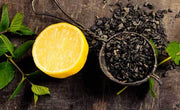8 Best Teas for Asthma Relief

We talk a lot about the health benefits of tea whether it is for hydration, reducing nausea, or boosting brain health. But maybe you or someone you know suffers from asthma or asthma-like symptoms from a cold, or exposure to pollution or smoke.
Are your lungs feeling a little more sensitive or tighter than usual? The shortness of breath, wheezing, and difficulty breathing can be a daily struggle. Of course, tea won't replace any asthma medication for sudden asthma attacks, but did you know that simply adding loose tea into your daily routine may help provide some relief from asthma symptoms? Yes, the warm steam from hot beverages can help you breathe easier if you're congested or have mild asthma, but studies show that some teas may provide even more relief.
Green Tea

Image courtesy of @HealthyWomen
Green tea is one of the most popular teas consumed not only for the flavor, but for the polyphenols, antioxidants, and nutrients it contains as well. These compounds have been shown to help lower the risk of heart disease, type 2 diabetes, and some cancers. But it may also provide relief from asthma symptoms.
Green tea contains caffeine, and this is a component of tea that has been studied for its effect on people with respiratory conditions. Caffeine may help relax smooth muscles such as those in the lungs and can help open airways similar to a bronchodilator. Studies have shown that even a low dose of caffeine can have an impact for up to 4 hours on the lung function and provide some relief.
Ginger Tea

Image courtesy of @powerofpositivity
We've been talking a lot about ginger tea lately. And there is a good reason because ginger is truly an amazing spice loaded with healthy nutrients and compounds such as gingerol and shogaols. The benefits of ginger root is really nothing new - it has been used for many years for its healing properties. Studies have shown that ginger tea may help relieve symptoms experienced by people with asthma. Coughing causes inflammation of both your chest and throat. Consuming ginger with its anti-inflammatory properties may help relax the smooth muscles in the lungs, break down mucus in the lungs, and improve circulation in the lungs which may make it easier to breathe.
Black Tea

Image courtesy of @healthifyme
Black tea comes from the same Camellia sinensis plant as green tea, and similar to green tea, black tea also contains caffeine. A stimulant that may help relax your airways and provide some relief from asthma.
Eucalyptus Tea

Image courtesy of @healthtips
You guessed it, eucalyptus tea does come from the leaves of the eucalyptus tree making it an herbal tea. The leaves contain amazing antioxidants, as well as a compound called eycalyptol which, again by decreasing mucus and expanding the bronchioles, may help treat asthma symptoms. Eucalyptus has long been studied for its muscle-relaxing effect, which is why it’s used in airway-opening rubs and salves. In this same way, eucalyptus tea may have an anti-spasmodic (muscle-easing) effect on the lungs and support easier breathing.
Peppermint Tea
Peppermint tea works similar to Eucalyptus tea in opening airways. Mint tea is also a treatment for allergies and asthma by acting as an anti-inflammatory and decongestant. However, those with reflux should be cautious as it may relax the sphincter muscle causing increased heartburn.
Licorice Tea

Image courtesy of @vaya
If you are like me, you lovvvvve licorice. Licorice tea is made from the root of the licorice plant. The root has been used to treat asthma symptoms for years. Licorice triggers mucus production which can gently coat and soothe airways. This effect is especially helpful for easing a nagging cough. Many tea blends such as Rooibos Orange Tea and Immunity Boost Tea include licorice in their ingredients.
Mullein Tea

Image courtesy of @healthline
Mullein is an herbaceous plant of the figwort family with tall spikes of yellow flowers, native to Eurasia. Mullein oil extracted from the flower or leaves is used to remedy earaches and some skin conditions such as eczema. The leaves are also used to create a rich, aromatic tea that has been used for years to treat chronic coughs and colds, as well as asthma. Again, by reducing inflammation, Mullein can help relax the respiratory muscles.
Fennel Tea
Another herb known to help improve respiratory health is fennel. Considered to be an anti-spasmodic, fennel tea may provide some lung relief. There are many teas that include fennel in the blend in with other ingredients, so be sure to check the label of your favorite blends!
Try two or three cups of tea throughout the day and you may feel some relief!





